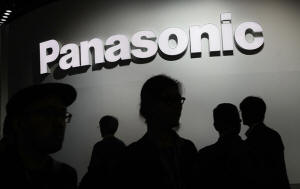|
The
job cuts, amounting to about 4% of its 230,000 workers, will
include early retirement offers in Japan and closures and
consolidation of various operations, according to the
Osaka-based maker of home appliances, such as washing machines
and refrigerators.
Panasonic also makes solar panels, delivery robots, facial
recognition technology, fuel cells for homes and EV batteries
for Tesla cars.
Also Friday, Panasonic reported a 17.5% drop in profit for the
fiscal year through March at 366 billion yen ($2.5 billion),
down from 443 billion yen in the previous fiscal year. It sales
totaled 8.46 trillion yen ($58 billion), down 0.5% year-on-year.
The company said the slowing global economy and weaker demand
for electric vehicles were a factor behind its weak results. But
sales of air-conditioners and consumer electronics products held
up in Japan, it said.
The company's chief executive, Yuki Kusumi, told reporters his
heart felt heavy in announcing the job cuts. Panasonic did not
mention U.S. President Donald Trump’s tariff policies as a
factor behind its drop in profit.
Panasonic forecast that its profit will improve by at least 150
billion yen ($1 billion) by the fiscal year through March 2027,
and by 300 billion yen ($2.1 billion) by the fiscal year through
March 2029.
That will be achieved through management reform, closure of
unprofitable businesses and building a system that’s more
responsive to changes in the business environment, officials
told reporters.
But the turnaround will take time and profit will slip further
in this fiscal year. For the fiscal year through March 2026,
Panasonic is projecting a 310 billion yen ($2.1 billion) profit
on 7.8 trillion yen ($54 billion) sales.
Panasonic said it remains bullish about EV batteries and plans
to supply Japanese automakers Mazda Motor Corp. and Subaru Corp.
in new strategic partnerships.
All contents © copyright 2025 Associated Press. All rights reserved

|
|




